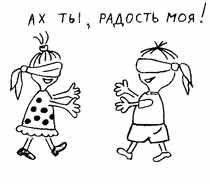The Dual Relationship
© Descriptions of relationships: Victor Gulenko,
1989
Pictures: Marianna Lytova, 2002
Translation: Dmitri Lytov, Darren Chappell, 2003
Quadra |
Rational pairs |
Irrational pairs |
| 1 (alpha) | ||
| 2 (beta) | ||
| 3 (gamma) | ||
| 4 (delta) |
 Picture: "Oh my sweetheart!".
Picture: "Oh my sweetheart!".
This is the relationship of psychological complement. It is the most favorable in providing for one's basic activities. It is also the most comfortable, because partners do not need to change their own personality in order to adapt to the other (although every successful communication requires some effort, and the dual partnership is no exception). In other words, you may "remain yourself" in communication with your dual. If you succeed in getting along with your dual (especially of the opposite sex), responsibilities in your pair will be distributed in such a way that strong traits of one partner will protect weak traits of the other.
Conflicts in dual pairs may take place, but they are rare because their solution does not really require anything beyond your basic capabilities. Partners suit each other like two halves of the same photo, making a complete picture. But because of this lack of conflict the result is that your dual seems to fade into the background when amongst other people. They seem to be too simple and ordinary, and thus not deserving of your attention. This first viewpoint is more common of extraverts. The second viewpoint consists in saying to yourself: he/she is too good for me and will scarcely like me. This viewpoint is more characteristic to introverts. However, both these viewpoints are rather peculiar to people without experience of dual communication in childhood.
How can one detect his dual? Initially communication with your dual does not create any special feeling of comfort: everything progresses quite ordinarily and does not awake special emotions. Your dual is perceived as your shadow, as something quite natural and thus meaning nothing. Only upon parting with him/her you gradually begin to understand how you needed him/her. Losing your dual is perceived very painfully. Finally you begin to realize that his/her presence calms you down, that it gives a feeling of protection. This effect even increases for duals with suitable subtypes.
But do not overestimate duality! This is a model of relations for dealing with everyday problems. As you get used to your dual, you will begin to want something more, namely social significance of your personality, certain challenges and deviations from everyday activities. This cannot be achieved within dual relationships. And finally, do not forget that no one dual pair is omnipotent on the contrary, it is strong only within certain fields of activity, where the dual's strong traits complement each other.
On the other hand, it is very difficult to achieve social recognition without the support of your dual. In general, dualization is vitally necessary in two cases: first, in unfavorable social situations when your survival is at stake, and second, when you move upwards along the social hierarchy in which the competition is acute, i.e. for your career.
Functional Analysis: first functionsupport, second function support, direct order.